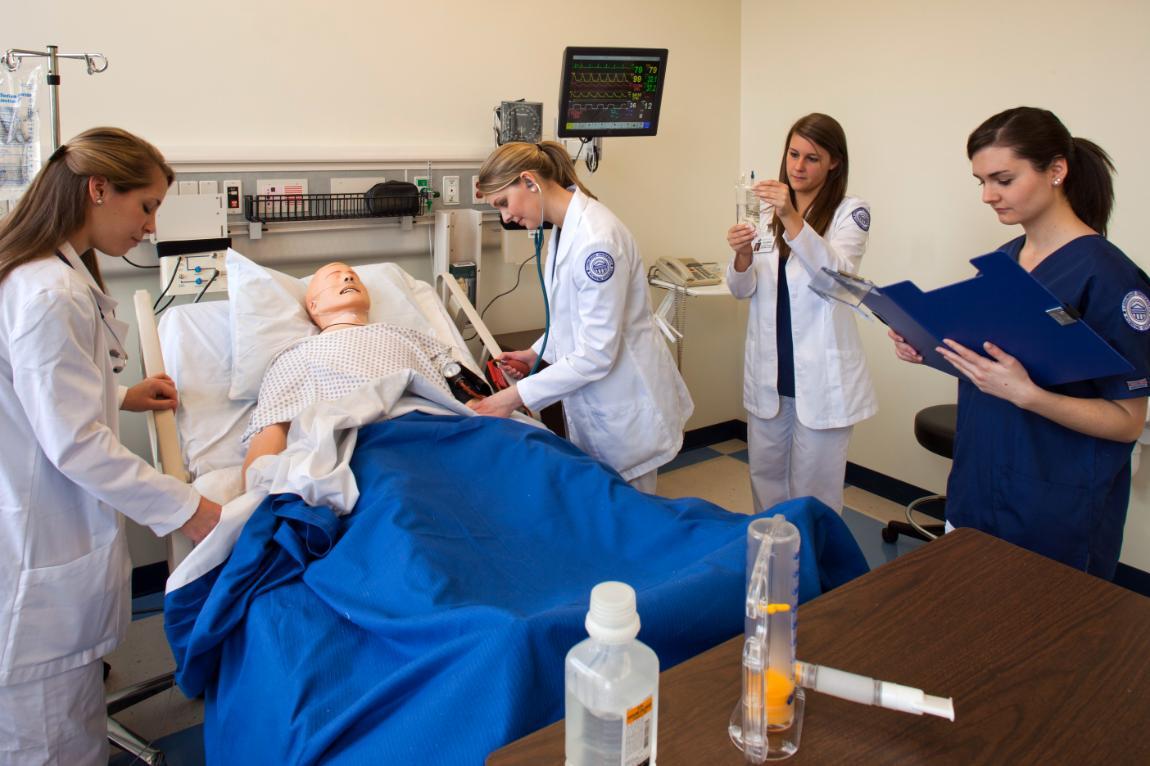

For the second straight year, Longwood University nursing program graduates have reached rarefied air by recording a 100 percent pass rate on their first attempt at the required licensure exam, an accomplishment few schools can boast.
All registered nurses must pass the national licensure exam, called the NCLEX, to become licensed to practice.
“It’s a huge deal,” said Dr. Lee Bidwell, interim chair of the Department of Nursing. “Our reputation has grown substantially in the last five years, and our students are graduating well-prepared to become fully licensed nurses. You just don’t see a 100 percent pass rate very often, for a lot of reasons, and our having back-to-back classes reach that height is not only pretty special but says a lot about the program and caliber of students who come here.”
Our reputation has grown substantially in the last five years, and our students are graduating well-prepared to become fully licensed nurses.
Dr. Lee Bidwell, interim chair of the Department of Nursing
Over the last several years, interest in the nursing program has been growing due to the program’s reputation and the success of its graduates. This year, Longwood implemented an early decision option for nursing program applicants seeking admission for the fall of 2018—a move that further increases the competitiveness of the program and has produced an even more talented applicant pool. In choosing the binding early decision option, applicants agree to attend Longwood if they are admitted into the Bachelor of Science in Nursing (BSN) program. Nursing is currently the only major at Longwood that employs binding early decision.
The early decision application deadline was Nov. 1, and about 20 students were accepted through the new process. The ideal freshman class size is roughly 60 students, and the program has received more than 500 applications so far.
“The nursing program is very competitive to get into, and we get really high-caliber students applying,” said Longwood Dean of Admissions Jason Faulk.
Nursing is a high-demand major at colleges and universities across the country, and Longwood has been a leader in nursing education in Virginia, offering a challenging program that gives freshmen the rare opportunity to enter immediately. At most other public colleges and universities in the state students have to take two years of general education courses and then apply to the nursing program as a junior.
“Because we offer this first-year nursing program admission it really attracts students with higher GPAs who are excited to dive right into their career path,” Bidwell said. “We’ve seen that in our application pool. It’s a benefit for us to be able to be so selective because then we get very top-quality students coming into the program.”
The NCLEX exam rate success can be attributed to multiple factors, including the hard work and expertise of the nursing faculty and the clinical experience students receive.
The quality of our real-life simulations, as well as the level of clinical experience we provide, really help prepare our students for success on the NCLEX test
Cindy Crews, Longwood’s clinical simulation learning center director
Longwood offers state-of-the-art simulation experiences for nursing students at the Edward I. Gordon Clinical Simulation Learning Center, a 10,000-square-foot facility that includes a mother-infant patient simulation lab, patient examination room and home care learning center.
The center is named for Dr. Edward Gordon, a longtime Farmville physician, who donated $1 million to establish the center.
“Our students get lots of hands-on experience,” said Cindy Crews, Longwood’s clinical simulation learning center director. “We get a lot of feedback from employers that Longwood students are better-prepared than their peers from other schools because of the simulations they have been through in our lab.”
In the simulation lab, students practice a wide variety of live scenarios on mannequins. A digital audiovisual system allows simulated experiences to be recorded and then played back for faculty and student evaluation.
Bidwell said other factors in the NCLEX success are a new test-preparation product for students and revised tutoring programs that allow peer-to-peer mentoring.
Nursing students begin getting clinical experience at partner agencies in their sophomore year, which is far earlier than in most programs. Nursing majors also participate in an intensive practicum in the second semester of their senior year.
“The quality of our real-life simulations, as well as the level of clinical experience we provide, really help prepare our students for success on the NCLEX test,” Crews said.
The nursing program is in the middle of the Commission on College Nursing Education reaccreditation process. Bidwell said the program received a lot of positive feedback after a site visit in early November; the reaccreditation process will be completed in June. This year marks the program’s fifth consecutive year of full accreditation.
Meanwhile, the first graduates of Longwood’s RN to BSN program graduated in December 2016. The highly flexible program started two years ago and is geared toward adult learners who already have an associate’s degree and are registered nurses. Many of the students are employed at regional hospitals or clinics while earning their degrees, helping to meet the high demand for BSN-prepared nurses and putting their new expertise to work in southside Virginia.
